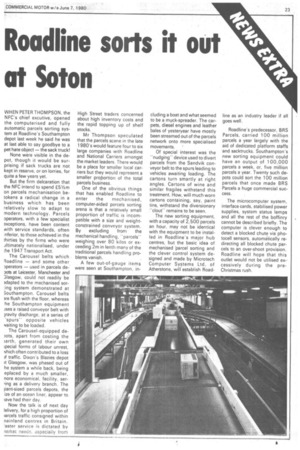Roadline sorts it out at Soton
Page 25

If you've noticed an error in this article please click here to report it so we can fix it.
WHEN PETER THOMPSON, the NFC's chief excutive, opened the computerised and fully automatic parcels sorting system at Roadline's Southampton depot last week he said he was at last able to say goodbye to a pet hate object — the sack truck!
None were visible in the depot, though it would be surprising if sack trucks are not kept in reserve, or on lorries, for quite a few years yet.
But the firm delcaration that the NFC intend to spend E51/2m on parcels mechanisation betokens a radical change in a business which has been relatively slow to adapt to modern technology. Parcels operators, with a few specialist exceptions, have been content ovith service standards, often inferior, to those achieved in the thirties by the firms who were Jltimately nationalised, under the 1947 Transport Act.
The Carousel belts which Roadline — and some other operators — used in parcels depots at Leicester, Manchester and 3Iasgow, could not readily be adapted to the mechanised sor:ing system demonstrated at 3outhampton. Carousel belts are flush with the floor, whereas he Southampton equipment ises a raised conveyor belt with 3ravity discharge, at a series of 'spurs' opposite vehicles waiting to be loaded.
The Carousel-equipped de)ots, apart from costing the )arth, generated their own Ipecial forms of labour unrest, vhich often contributed to a loss yf traffic. Dixon's Blazies depot it Glasgow, was phased out of he system a while back, being eplaced by a much smaller, nore economical, facility, serring as a delivery branch. The ;iant-sized parcels depots, the ize of an ocean liner, appear to. lave had their day.
Now the talk is of next day lelivery, for a high proportion of iarcels traffic consigned within nainland centres in Britain. 'aster service is dictated by narkez needs, especially from High Street traders concerned about high inventory costs and the rapid topping up of shelf stocks.
Mr Thompson speculated that the parcels scene in the late 1980's would feature four to six large companies with Roadline and National Carriers amongst the market leaders. There would be a place for smaller local carriers but they would represent a smaller proportion of the total parcels business.
One of the obvious things that has enabled Roadline to enter the mechanised, computer-aided parcels sorting arena is that a relatively small proportion of traffic is incompatible with a size and weightconstrained conveyor system. By excluding from the mechanical handling, ''parcels" weighing over 80 kilos or exceeding 2m in lenth many of the traditional parcels handling problems vanish.
A few out-of-gauge items were seen at Southampton, in
cluding a boat and what seemed to be a muck-spreader. The carpets, diesel engines and leather bales of yesteryear have mostly been streamed out of the parcels network onto more specialised movements. '
Of special interest was the "nudging" device used to divert parcels from the Sandvik conveyor belt to the spurs leading to vehicles awaiting loading. The cartons turn smartly at right angles. Cartons of wine and similar fragiles withstand this treatment. How, will much worn cartons containing, say, paint tins, withstand the diversionary "clout" remains to be seen.
The new sorting equipment, with a capacity of 2,500 parcels an hour, may not be identical with the equipment to be installed in Roadline's major hub centres, but the basic idea of mechanised 'parcel sorting and the clever control system designed and made by Microtech Computer Systems Ltd, of Atherstone, will establish Road
line as an industry leader if all goes well.
Roadline's predecessor, BRS Parcels, carried 100 million parcels a year largely with the aid of dedicated platform staffs and sacktrucks. Southampton's new sorting equipment could have an output of 100,000 parcels a week, or, five million parcels a year. Twenty such depots could sort the 100 million parcels that once made BRS Parcels a huge commercial success.
The microcomputer system, interface cards, stabilised power supplies, system status lamps and all the rest of the boffinry cannot be described briefly. The computer is clever enough to detect a blocked chute via photocell sensors, automatically redirecting all blocked chute parcels to an over-shoot provision. Roadline will hope that this outlet would not be utilised excessively during the preChristmas rush.




















































































































































